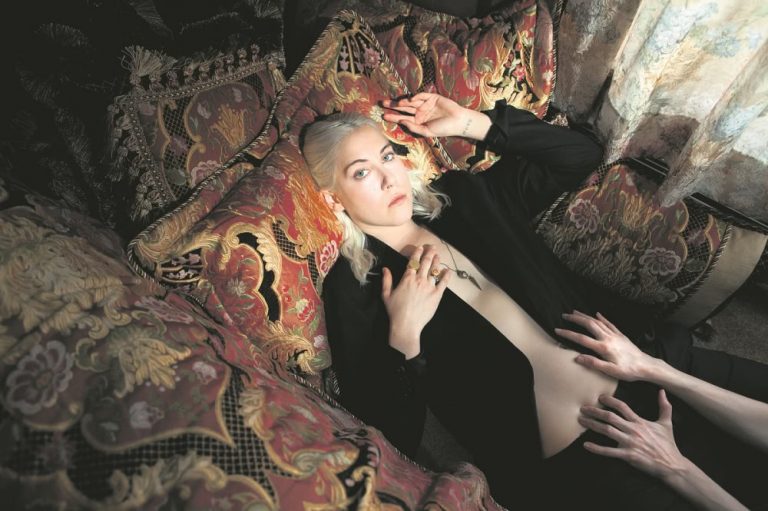Mackenzie Scott does not like crying, but when she reads Lorrie Moore’s short story collection Self-Help, she has no choice but to. “She’s one of the only writers that I have ever read that makes me physically sob,” Scott says, her voice crackling over the line from New York. It’s six thirty-something her time, and the musician behind the Torres name is having a quiet night in, resting up in preparation for the tour she will embark upon the next day. There’s some light noise in the background – it sounds like traffic – and when Scott pauses to think, it expands to fill the space. “I try to avoid crying, but with her it’s impossible not to.”
Scott reads a lot – she reads, and she goes for long walks, and she cooks. There was a time when she used to carry around J.D. Salinger’s Nine Stories like it was “a Bible”, and in the press release dropped to announce her new album Three Futures, she picked out Vladimir Nabokov and Moore as key influences. “I really love writing essays – or essay style things,” Scott says.
“I like writing haikus… I try to keep my toes dipped into all the honey pots, in terms of different forms of writing. They all have equal forms of merit. Songwriting is one of my loves, but I don’t actually prefer it any more than any other form of writing.”
And anyway, sometimes Scott’s records feel like books. Her self-titled debut had the precision and warmth you’d expect of Saul Bellow; its follow-up, Sprinter, the gently horrific intensity of Flannery O’Connor. Three Futures is something else entirely – more direct; precise; full of instrumental breaks dropped like full stops – but it is no less literary, or involving.
“I didn’t want any cymbals on this record – I didn’t want to hear any metal,” Scott says. “So my drummer didn’t play any cymbals. And I didn’t want any acoustic instruments. Which Rob [Ellis, producer] actually fought me on a little. He was like, ‘Wouldn’t it be so much more lush and lovely?’
“But I was pretty adamant about certain themes that I wanted to incorporate into every song to tie the record together. Not just lyrically but sonically. There were a lot of parameters that I put on it in terms of production.”
The thing about restrictions is they’re not actually restrictions if you know what you want
These parameters were as rigid as the syllable breakdown in a haiku, and just as freeing. Through them, Scott found precision – a clarity of speech, and of sound. You can hear it on ‘Helen In The Woods’, the most direct, unobscured song she has yet written, and you can hear it on ‘Righteous Woman’, packed as it is with guitar parts that buzz like tin foil against fillings.
“The thing about restrictions is they’re not actually restrictions if you know what you want. That’s thematically in the lyrics of this record. Options can actually be really flustering. Having too many options can leave you a bit unfocused and torn. And that’s not the kind of record I wanted to make.
“I didn’t want to make a record that felt like I was dabbling, or like I was experimenting with sounds and themes and throwing things on that sounded good. It’s not always necessarily about sounding good … It’s not always about making something sound beautiful. I think there’s something to be said to making something sound exactly the way you want to make it sound.”
Not that Scott necessarily finds it easy to translate the ideas crawling around her head into song. Writing is sometimes a little like untangling wool from barbed wire; like having to stay very quiet for a very long time, and let the song just explain itself, slowly.
“The songs let me know what they want to be. I’m in no way starting from the ground up, trying to come up with a scene for a song. It’s always based on something that has been brewing for a long time.
“But they don’t just come to me written. It’s like whatever I am thinking about, or obsessing about … those are all things that make themselves present as I write. But the actual construction of the songs – that never just comes to me. It takes weeks and months and years. There have been songs that from infancy to completion – or rather from gestation to birth – have taken one or two years to actually become full songs ready to be performed or recorded.”
Which means songwriting is frustrating, and time-consuming, and energy sapping, and the kind of thing you wouldn’t necessarily wish upon someone. But Scott is done with letting that get to her. “I can’t really do anything about how I write. You never wanna look a song right in the eye. Especially if you’re just trying to get the ideas down. It’s always a matter of letting the song think that I don’t know it’s in my peripheral. You have to kind of fool it, and then it gets a little closer – it’s kinda like a cat, or something. You know, when a cat thinks that you’re not looking at it, that’s when it will sneak closer and closer to you. The goal is to not look around and scare it off with your enthusiasm.”
That’s why Scott is jealous, sometimes, of painters; of people who work in visual arts, and don’t have to talk, or explain themselves. They can just bypass language. They can just do. “It’s so frustrating,” Scott laughs. “Yeah; bypassing language. That’s why it’s so frustrating that I can’t draw or paint. Sometimes you don’t want to write a damn song; you just wanna draw your dreams.”
Three Futures is out Friday September 29 through 4AD / Remote Control. It is The Brag’s album of the fortnight – you can read that review here.
Header credit: Ashley Connor.


































